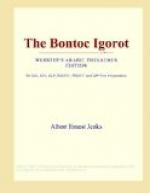It is considered warfare by the group of the murdered person, and as such to be met by return warfare unless the group of the murderer is a friendly one and at once comes to the offended people to sue for continued peace. This applies to political groups within a pueblo as well as to the people of distinct pueblos.
When murder is considered simply as a crime, its punishment may be one of two classes: First, the murderer may lose his life at the hands of his own group; second, the crime may be compounded for the equivalent of the guilty man’s property. In this case the settlement is between the guilty person and the political group of the victim, and the value of the compound is consumed by feastings of the group. No part of the price is paid the family of the deceased as a compensation for the loss of his labor and other assistance.
The three following specific cases of misdemeanors will illustrate somewhat, more fully the nature of differences which arise between individuals in pure Igorot society:
In Samoki early in November, 1902, Bisbay pawned an iron pot — a sugar boiler — to Yagao for 4 pesos. In about two months, when sugar season was on, Bisbay went to redeem his property, but Yagao would neither receive the money nor give up the boiler. The old men of the ato counseled together over the matter, and, as a result, Yagao received the 4 pesos and returned the pot, and the matter was thus amicably settled between the two.
Early in January, 1903, Mowigas, of the pueblo of Ganang, cut and destroyed the grasshopper basket of Dadaag, of the pueblo of Mayinit, and also slightly cut Dadaag with his ax, but did not attempt to kill him. The cause of the assault was this: Mowigas had killed a chicken and was having a ceremonial in his house at the time Dadaag passed with his basket of grasshoppers. According to Igorot custom he should not have taken grasshoppers past a house in which such a ceremony was being performed. The breach made it necessary to hold another ceremony, killing another chicken. Old men from Mayinit, the pueblo of Dadaag, came to Ganang and told Mowigas he would have to pay 3 pesos for his conduct, or Mayinit would come over and destroy the town. He paid the money, whereas the basket was worth only one-sixth the price. Trouble was thus averted, and the individuals reconciled. In this case the two pueblos are friends, but Mayinit is much stronger than Ganang, and evidently took advantage of the fact.
In January, 1903, a woman and her son, of Titipan, stole camotes of another Titipan family. The old men of the two ato of the interested families fined the thieves a hog. The fine was paid, and the hog eaten by the old men of the two ato.
Very often the fine paid by the offender passes promptly down the throats of the jury. However, it is the only compensation for their services in keeping the peace of the pueblo, so they look upon it as their rightful share — it is the “lawyer’s share” with a vengeance.




